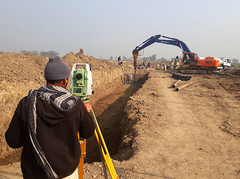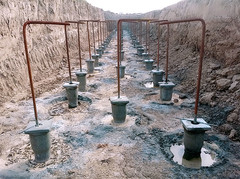
of ductile iron piles according to an
ÖNORM standard in Pakistan
© Tiroler Rohre GmbH/Neville Wood
Since the 1980s, driven piles made of ductile cast iron have been used as an economical as well as technically advanced high-quality deep foundation method in Austria and increasingly also in many other countries. They are used as foundation elements in structural and civil engineering, industrial, pipeline and bridge construction as well as in special applications. After all, full displacement piles made of ductile cast iron that are installed by driving them into the ground efficiently transmit forces from a structure to the ground.
Requirements on design, quality assurance, structural engineering and installation are laid down in ÖNORM B 2567 in Austria today. For the first time, they were specified in ONR 22567 published in 1999 that was completely revised based on the Eurocodes and issued as ÖNORM B 2567 in 2012. As this Austrian has standard attracted great interest internationally, an English version was made available as well.
International application in Pakistan
Tiroler Rohre GmbH has produced and delivered piling systems made of ductile cast iron to countries all over the world for more than 30 years. Owing to its expertise, the company based in Hall in the Tyrol was awarded a contract for a major deep foundation project in Pakistan. The client was the Frontier Works Organization, the science and technology branch of the Pakistan Army.
 The task was to produce deep foundations for two bridges needed for the six-lane highway from Lahore, the second-most populous city of the country, and Sialkot in the north-west of Pakistan. The original plans provided for four large drilled piles per bridge abutment, i.e. a total of 16 piles. In view of the high costs of conventional deep foundations, a piling system made up of ductile cast-iron piles was proposed and used as a more economical alternative that, in addition to its technical advantages, also resulted in significant savings of concrete and energy and, hence, lower costs.
The task was to produce deep foundations for two bridges needed for the six-lane highway from Lahore, the second-most populous city of the country, and Sialkot in the north-west of Pakistan. The original plans provided for four large drilled piles per bridge abutment, i.e. a total of 16 piles. In view of the high costs of conventional deep foundations, a piling system made up of ductile cast-iron piles was proposed and used as a more economical alternative that, in addition to its technical advantages, also resulted in significant savings of concrete and energy and, hence, lower costs.
Type 118 piles with a wall thickness of 7.5 mm and a conical pile shoe were used. In order to prepare a proposal for this project and, at the same time, optimize the design of the deep foundation, calculations had to be made and evidence had to be provided. These were based on the English version of ÖNORM B 2567 that was also accepted as a recognized and technically advanced specification by the client.
For almost half a century, Tiroler Rohre GmbH has actively participated in the development of standards, as Ing. Christian Auer, Head of Quality Management, reports. Auer: "During the preparation of the standard we were able to input both our long-standing experiences and the user perspective. The international interest in this standard is a wonderful recognition of the high quality of this document as well as of Austrian products."
Bibliography
ÖNORM B 2567 Piles of ductile iron - Requirements for components, their design and installation
Committee 090 "Cast iron pipes" is responsible for the development of this standard.

